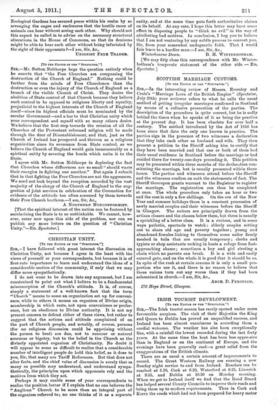[To THE EDITOR OF THE " SPECTATOR."1 SIR,—Mr. Sutton Nelthorpe
begs the question entirely when he asserts that "the Free Churches are compassing the destruction of the Church of England." Nothing could be further from the minds of Free Churchmen than the destruction or even the injury of the Church of England as a branch of the visible Church of Christ. They desire the abolition of State control of that Church because they believe such control to be opposed to religious liberty and equality, prejudicial to the highest interests of the Church of England itself—since its highest officials must be nominated by the secular Government—and a bar to that Christian unity which your correspondent and myself with so many others desire. We believe that the first step towards the reunion of all the Churches of the Protestant reformed religion will be made through the door of Disestablishment, and that, just as the Church of Ireland has prospered and thriven as a religious organization since its severance from State control, so we believe the Church of England would gain immeasurably as a spiritual entity by severing the bonds which unite it to the State.
I agree with Mr. Sutton Nelthorpe in deploring the fact that Churches whose differences are so small " should waste their energies in fighting one another." But again I submit that in that fighting the Free Churches are not the aggressors. We need not look beyond the reception accorded by the vast majority of the clergy of the Church of England to the sug- gestion of joint services in celebration of the Coronation for evidence of the attitude too often assumed by them towards their Free Church brethren.—I am, Sir, &c.,
A NORTHERN NONCONFORMIST.
[That the spiritual interest of the nation can be fostered by secularizing the State is to us unthinkable. We cannot, how- ever, enter now upon this side of the problem, nor can we publish any more letters on the question of " Christian Unity."—ED. Spectatorl






































 Previous page
Previous page